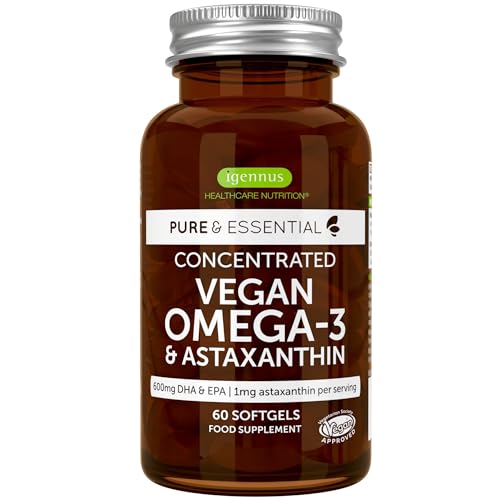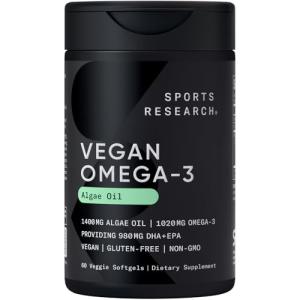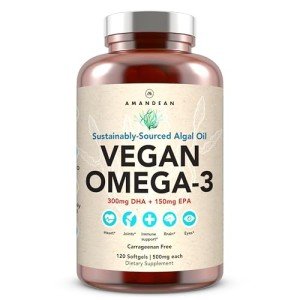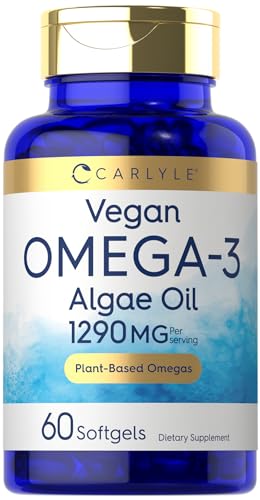Vegan omega 3 fatty acids are making waves in the health community, especially for those looking to improve heart health. These essential fats, commonly found in sources like flaxseeds, chia seeds, and algae, play a crucial role in maintaining a healthy cardiovascular system. But what is vegan omega 3 good for when it comes to our hearts? Let’s dive into the benefits!
One of the primary benefits of vegan omega 3 is its ability to reduce inflammation in the body. Chronic inflammation is a significant contributor to heart disease, and omega 3s are known for their anti-inflammatory properties. By incorporating vegan omega 3 into your diet, you can help keep your heart healthy and reduce the risk of developing cardiovascular issues.
Moreover, vegan omega 3 is essential for regulating blood pressure and improving cholesterol levels. Studies suggest that omega 3 fatty acids can lower triglycerides while increasing HDL (the "good" cholesterol). This balance is vital for maintaining a healthy heart. So, if you’re wondering what is vegan omega 3 good for, consider its role in promoting better blood flow and reducing the risk of arterial plaque buildup.
Lastly, vegan omega 3 can also support overall heart rhythm. Some research indicates that these fats might help lower the risk of arrhythmias, or irregular heartbeats, which can lead to serious health complications. Adding vegan omega 3 sources to your diet can contribute to heart health and help keep your heartbeat steady.
How Vegan Omega 3 Supports Brain Function
Vegan Omega 3 is gaining popularity as a vital nutrient that plays a crucial role in brain function. Unlike traditional sources like fish oil, vegan Omega 3 is derived from algae and other plant-based sources. These alternative sources are not only sustainable but also free from toxins often found in fish, making them an excellent choice for those who are conscious of both their health and the environment.
One of the primary components of vegan Omega 3 is alpha-linolenic acid (ALA), which is an essential fatty acid that the body cannot produce on its own. ALA is known for its ability to support cognitive health and improve memory function. When you incorporate vegan Omega 3 into your diet, you provide your brain with the necessary building blocks it needs to thrive. This is particularly beneficial as we age, helping to maintain mental clarity and reduce the risk of cognitive decline.
Research shows that ALA also plays a role in reducing inflammation throughout the body, which can positively impact brain health. Chronic inflammation is linked to various neurological issues, and by including vegan Omega 3 in your nutritional arsenal, you're taking proactive steps to shield your brain against potential harm. This is just one of the many ways this powerhouse nutrient answers the question, "what is vegan omega 3 good for?"
Additionally, vegan Omega 3 may support mood stability and mental well-being. Studies suggest that getting enough Omega 3 fatty acids can help improve symptoms of anxiety and depression. By adding vegan sources of this nutrient into your diet, you may not only enhance your cognitive abilities but also lift your spirits. Therefore, investing in vegan Omega 3 is a natural way to nourish both your brain and your emotions.
Vegan Omega 3 and Joint Health Explained
When exploring the question of what is vegan omega 3 good for, one of the most significant benefits lies in its support for joint health. Omega-3 fatty acids, particularly EPA and DHA, play a crucial role in reducing inflammation in the body. For those who follow a vegan diet, obtaining these essential fatty acids from plant-based sources can contribute to maintaining healthy joints, potentially easing discomfort associated with conditions like arthritis.
Plant-based sources of omega-3, such as flaxseeds, chia seeds, and walnuts, are rich in ALA (alpha-linolenic acid), which the body can convert into EPA and DHA. While the conversion rate is not as efficient as directly consuming fish oil, regular consumption of these vegan sources can still provide substantial health benefits. Studies suggest that incorporating vegan omega-3 into your diet may help reduce joint pain and stiffness, allowing for greater mobility and an improved quality of life.
Moreover, the anti-inflammatory properties of vegan omega-3 can also support overall joint health by promoting less wear and tear on cartilage. This means that for individuals looking for ways to protect their joints and maintain an active lifestyle, understanding what is vegan omega 3 good for goes beyond simple nutrition; it encompasses overall wellness and longevity. By integrating these plant-based omega-3 sources into your daily diet, you can take significant steps toward supporting your joint health naturally.
Sources of Vegan Omega 3 to Explore
When exploring the world of vegan nutrition, one important aspect to consider is omega-3 fatty acids. Many people wonder, what is vegan omega 3 good for? These essential fats play a crucial role in maintaining heart health, supporting brain function, and reducing inflammation. Fortunately, there are several plant-based sources of omega-3 that can easily be incorporated into your daily diet.
One of the most popular sources of vegan omega-3 is flaxseeds. These tiny seeds are packed with alpha-linolenic acid (ALA), a type of omega-3 that the body can convert to the more commonly known EPA and DHA found in fish. You can add flaxseeds to smoothies, oatmeal, or baked goods for a nutty flavor and a nutritional boost. Ground flaxseed is often easier for the body to digest, so consider using it in your recipes.
Chia seeds are another excellent source of vegan omega-3. Just like flaxseeds, they provide a good amount of ALA and can be incorporated into various dishes. You can sprinkle chia seeds on salads, blend them into smoothies, or use them to make a delicious chia pudding. Not only will you benefit from the omega-3 content, but you'll also enjoy the added fiber and protein these seeds offer.
Walnuts are also a fantastic source of vegan omega-3s. Snack on a handful for a healthy treat, or add them to your salads and baked goods for a crunchy texture. They are a versatile nut that not only provides omega-3 fatty acids but also offers a range of other nutrients that support overall health.
Lastly, consider incorporating algae-based supplements into your diet. Algae oil is a direct source of EPA and DHA, making it a potent option for those seeking the benefits of omega-3 without consuming fish. These supplements are especially great for vegetarians and vegans looking to enhance their omega-3 intake while answering the question, what is vegan omega 3 good for? By exploring these sources, you can ensure you're meeting your omega-3 needs for optimal health.




